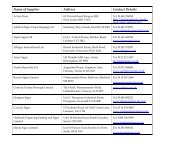titlepage/contents pg 1-16 - British Parking Association
titlepage/contents pg 1-16 - British Parking Association
titlepage/contents pg 1-16 - British Parking Association
Create successful ePaper yourself
Turn your PDF publications into a flip-book with our unique Google optimized e-Paper software.
34 Chapter 3City Council is the only authorityconsidering introducing a WPLscheme.<strong>Parking</strong> chargesUnlike workplace parking levies,charges for publicly availableparking are widely used. By 2002there were no more than ahandful of towns where all publicparking was free of charge. The1984 Act contains the main legalprovisions with regard to parkingcharges.Local authorities may:● Charge for parking in offstreetcar parks (undersection 35 of the 1984 Act);● Charge for parking in onstreetparking places (undersections 45 and 46 of the1984 Act).Charging for on-street parkingrequires an order to be made. Anorder is not required for off-streetparking unless penalties are tobe imposed through penaltynotices. Privately owned carparks for public use mustoperate without an order, unlessthere is an agreement with thelocal authority.The legislation provides forpayment to be made to a meteror ticket machine, or indicated bya parking device (which can be acard, disc, token or other similardevice). It also provides for theissue of permits (with or withoutcharge) allowing vehicles to useparking places.Provisions can also be made foron-street parking places to bereserved for special categories(or classes) of vehicle and forspecial charges to be made orpermits issued for those classesof vehicle.Section 46 of the 1984 Actprovides for “initial” and “excess”charges at on-street parkingplaces and Section 47 makes itan offence to park for a periodlonger than the excess chargeperiod or to fail to pay the initialcharge. Where enforcement isdecriminalised, the 1991 Actreplaces these with “parking”and “penalty” charges.When introducing on-streetparking schemes, localauthorities must have regard tothe purpose of the powersincorporated in both the 1984and 1991 Acts. In particular, theyare not fiscal measures. The aimshould not be to raise revenue,but to serve a policy objectivesuch as to reduce congestion.However if, as a result of settingenforcement or parking chargesto meet the objectives of thescheme, income exceeds thatrequired simply to coverexpenditure, this is acceptable.Further advice on parking policyand charges is given in LocalAuthority Circular 1/95, (7 and 8).The advice for Londonauthorities is somewhat widerthan Circular 1/95 (for example itincludes advice on permit policyand charges) but it is a usefulreference for any local authority.Additional parkingchargesUnder decriminalised parking,the penalty charge, any chargespaid to secure the release of aclamped (immobilised) orimpounded vehicle (after towaway),and storage and disposalcharges are known collectivelyas “additional parking charges”.Additional parking charges areset, in London, by the <strong>Association</strong>of London Government’sTransport and EnvironmentalCommittee (subject to theapproval of the Mayor of London)and in the rest of England by theSecretary of State. There arecurrently three penalty chargebands in London and anotherthree for areas outside London.Use of surplus fundsChapter 10 and Annex Bprovides further details on suchfunds. There are different rulesfor the use of surplus funds foron- and off-street parking, withthe latter being much lessconstrained. Inclusion of localenvironmental improvements is arecently added item.







